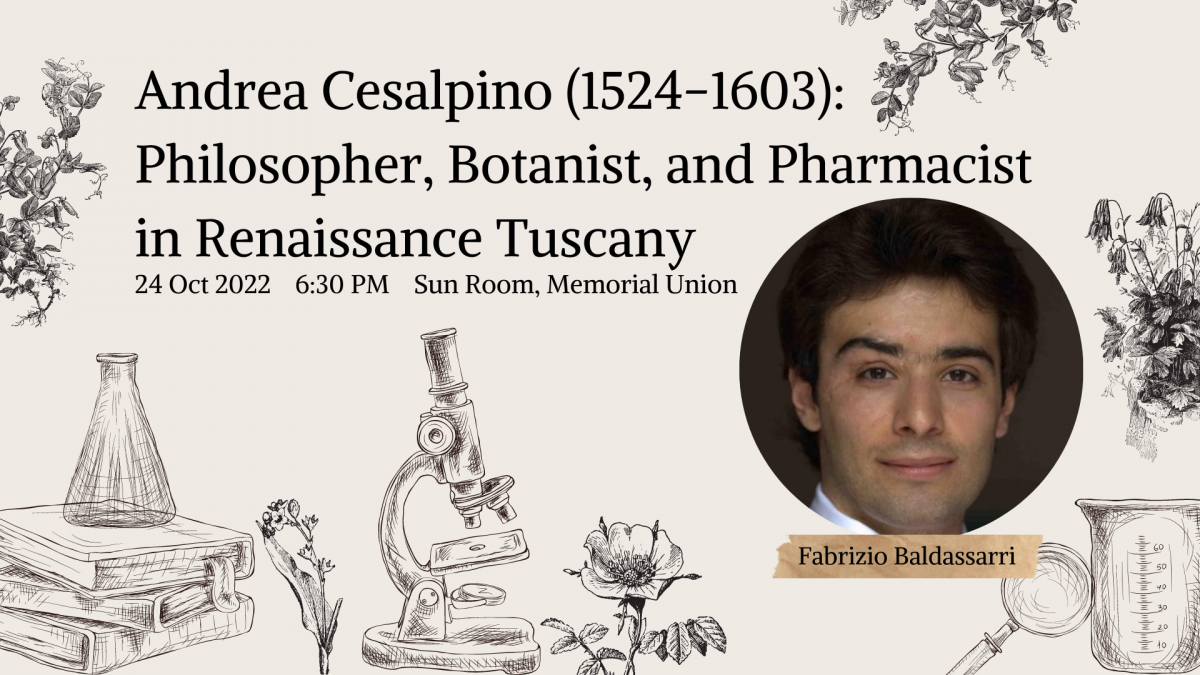Andrea Cesalpino (1524-1603): Philosopher, Botanist, and Pharmacist in Renaissance Tuscany
- Art and Visual Culture
- Biological/Pre-Med Illustration
- College of Design
- Committee on Lectures (funded by Student Government)

Historians often consider Andrea Cesalpino as the precursor of scientists like Galileo, William Harvey, Spinoza or Linnaeus. Yet today he remains mostly unknown, his impact localized to Renaissance Tuscany. Not only is this oversight an injustice to Cesalpino’s complex work on nature, and especially on plants, but it also disregards his approach to philosophy, nature, and medicine. Cesalpino served as professor of practical medicine at the University of Pisa and at La Sapienza in Rome and as physician to the pope. Cesalpino’s publications reveal the variety of his subjects: besides his famous De plantis libri XVI (1583), he published a text on philosophy (1571), one on demonology (1580), one on metallurgy (1596), and two on practical medicine (1593, and 1602-1603), revealing a complex intersection of diverse interests and specializations. This intersection further manifests in his work on plants. De plantis is one of the most powerful theoretical texts on botany written during the Renaissance. In it Cesalpino aimed to frame the study of plants within an Aristotelian framework, while, at the same time, he upheld the value of practical, pharmacologic virtues of plants and the collection and representation of naturalia. In his herbarium (dried garden) (1563), one of the first modern herbaria of the Renaissance, Cesalpino demonstrated that work on plants combines the theory of philosophers with the practice of pharmacists. A new attention to his work with plants thus highlights the importance of his botanical studies.
This presentation exposes the many and diverse layers of Cesalpino’s life and work on plants, concentrating on the interconnections he cultivated between theoretical philosophy, epistemology, and natural philosophy.
Fabrizio Baldassarri holds a Marie Skłodovska-Curie fellowship to conduct research on early modern natural philosophical studies of plants from Andrea Cesalpino to Marcello Malpighi, especially focusing on the intersections between natural philosophy, botany, and medicine. He has published widely on Descartes’s medical and botanical words. Author of Il metodo al tavolo anatomico. Descartes e la medicina (Method at the Anatomical Table: Descartes and medicine, 2021), Baldassari is also co-editor of Scientiae in the History of Medicine (Rome, 2021) and
Vegetative Powers (Springer, 2021), as well as several special issues on plants in early modern natural philosophy and knowledge. He is now working on a volume on Andrea Cesalpino and one on plants in pre-modern medicine.
This event will be recorded and available to users with an iastate.edu email address, per the speaker's request, at https://www.lectures.iastate.edu/recordings/available-recordings